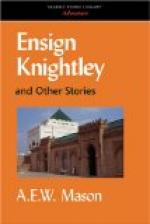“You have reason I take the liberty to say,” said Sir Charles absently, and he went back to his room puzzling over what he had seen, and over what he could neither see nor understand. The desire for sleep was altogether gone from him. He opened his window and leaned out. The rain had ceased, but the branches still dripped and the air was of an incomparable sweetness. Blackbirds and thrushes on the lawns, and in the thicket-depths were singing as though their lives hung upon the full fresh utterance of each note. A clear pure light was diffused across the world. Fosbrook went back to his old idea of some vengeful pursuit sprung from a wrong done long ago in Tangier. The picture of Major Lashley struck with terror as he got news of his pursuers, and slinking off into the darkness. Even now, somewhere or another, on the uplands or the plains of England, he might be rising from beneath a hedge to shake the rain from his besmeared clothes, and start off afresh on another day’s aimless flight. The notion caught his imagination and comforted him to sleep. But in the morning he woke to recognise its unreality. The unreality became yet more vivid to him at the breakfast-table, when he sat with two pairs of young eyes turning again and again trustfully towards him. The very reliance which the man and woman so clearly placed in him spurred him. Since they looked to him to clear up the mystery, why he must do it, and there was an end of the matter.
He was none the less glad, however, when Mr. Jerkley announced his intention of returning home. There would at all events be one pair of eyes the less. He strolled with Mr. Jerkley on the terrace after breakfast with a deep air of cogitation, the better to avoid questions. Gibson Jerkley, however, was himself in a ruminative mood. He stopped, and gazing across the valley to the riband of road descending the hill:
“Down that road the soldier came,” said he, “whose stories brought about all this misfortune.”
“And very likely down that road will come the bearer of news to make an end of it,” rejoined Fosbrook sententiously. Mr. Jerkley looked at him with a sudden upspringing of hope, and Sir Charles nodded with ineffable mystery, never guessing how these lightly spoken words were to return to his mind with the strength of a fulfilled prophecy.
As he nodded, however, he turned about towards the house, and a certain disfigurement struck upon his eyes. Two windows on the first floor were entirely bricked up, and as the house was square with level tiers of windows, they gave to it an unsightly look. Sir Charles inquired of his companion if he could account for them.
“To be sure,” said Jerkley, with the inattention of a man diverted from serious thought to an unimportant topic. “They are the windows of the room in which Mrs. Mardale died a quarter of a century ago. Mr. Mardale locked the door as soon as his wife was taken from it to the church, and the next day he had the windows blocked. No one but he has entered the room during all these years, the key has never left his person. It must be the ruin of a room by now. You can imagine it, the dust gathering, the curtains rotting, in the darkness and at times the old man sitting there with his head running on days long since dead. But you know Mr. Mardale, he is not as other men.”




